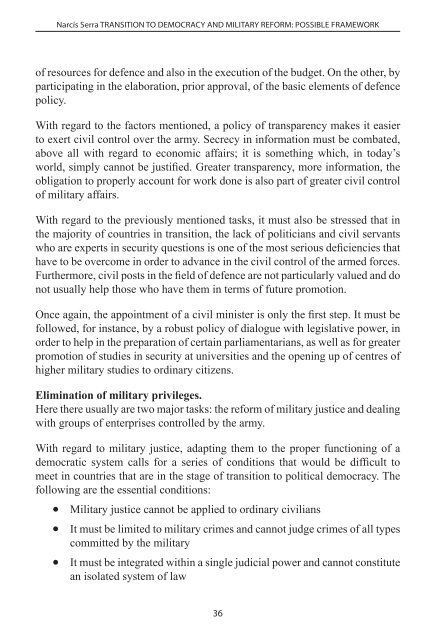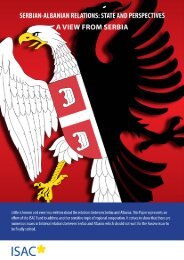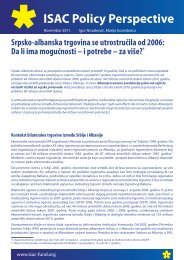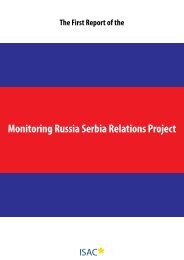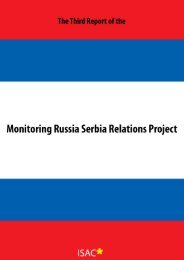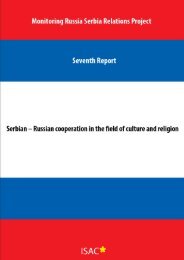the process of security sector reform - ISAC Fund
the process of security sector reform - ISAC Fund
the process of security sector reform - ISAC Fund
You also want an ePaper? Increase the reach of your titles
YUMPU automatically turns print PDFs into web optimized ePapers that Google loves.
Narcís Serra TRANSITION TO DEMOCRACY AND MILITARY REFORM: POSSIBLE FRAMEWORK<br />
Narcís Serra TRANSITION TO DEMOCRACY AND MILITARY REFORM: POSSIBLE FRAMEWORK<br />
<strong>of</strong> resources for defence and also in <strong>the</strong> execution <strong>of</strong> <strong>the</strong> budget. On <strong>the</strong> o<strong>the</strong>r, by<br />
participating in <strong>the</strong> elaboration, prior approval, <strong>of</strong> <strong>the</strong> basic elements <strong>of</strong> defence<br />
policy.<br />
With regard to <strong>the</strong> factors mentioned, a policy <strong>of</strong> transparency makes it easier<br />
to exert civil control over <strong>the</strong> army. Secrecy in information must be combated,<br />
above all with regard to economic affairs; it is something which, in today’s<br />
world, simply cannot be justified. Greater transparency, more information, <strong>the</strong><br />
obligation to properly account for work done is also part <strong>of</strong> greater civil control<br />
<strong>of</strong> military affairs.<br />
With regard to <strong>the</strong> previously mentioned tasks, it must also be stressed that in<br />
<strong>the</strong> majority <strong>of</strong> countries in transition, <strong>the</strong> lack <strong>of</strong> politicians and civil servants<br />
who are experts in <strong>security</strong> questions is one <strong>of</strong> <strong>the</strong> most serious deficiencies that<br />
have to be overcome in order to advance in <strong>the</strong> civil control <strong>of</strong> <strong>the</strong> armed forces.<br />
Fur<strong>the</strong>rmore, civil posts in <strong>the</strong> field <strong>of</strong> defence are not particularly valued and do<br />
not usually help those who have <strong>the</strong>m in terms <strong>of</strong> future promotion.<br />
Once again, <strong>the</strong> appointment <strong>of</strong> a civil minister is only <strong>the</strong> first step. It must be<br />
followed, for instance, by a robust policy <strong>of</strong> dialogue with legislative power, in<br />
order to help in <strong>the</strong> preparation <strong>of</strong> certain parliamentarians, as well as for greater<br />
promotion <strong>of</strong> studies in <strong>security</strong> at universities and <strong>the</strong> opening up <strong>of</strong> centres <strong>of</strong><br />
higher military studies to ordinary citizens.<br />
Elimination <strong>of</strong> military privileges.<br />
Here <strong>the</strong>re usually are two major tasks: <strong>the</strong> <strong>reform</strong> <strong>of</strong> military justice and dealing<br />
with groups <strong>of</strong> enterprises controlled by <strong>the</strong> army.<br />
With regard to military justice, adapting <strong>the</strong>m to <strong>the</strong> proper functioning <strong>of</strong> a<br />
democratic system calls for a series <strong>of</strong> conditions that would be difficult to<br />
meet in countries that are in <strong>the</strong> stage <strong>of</strong> transition to political democracy. The<br />
following are <strong>the</strong> essential conditions:<br />
• Military justice cannot be applied to ordinary civilians<br />
• It must be limited to military crimes and cannot judge crimes <strong>of</strong> all types<br />
committed by <strong>the</strong> military<br />
• It must be integrated within a single judicial power and cannot constitute<br />
an isolated system <strong>of</strong> law<br />
• The Penal Code applied by judges must be separated from disciplinary<br />
legislation, which must be applied by high ranking military <strong>of</strong>ficials.<br />
• The military high command cannot have jurisdictional powers and<br />
functions, i.e., <strong>the</strong>y can’t be judges, preside over or form part <strong>of</strong> tribunals,<br />
accept sentences, etc.<br />
In many countries <strong>the</strong> task <strong>of</strong> adapting military justice usually comes up against<br />
<strong>the</strong> serious problem <strong>of</strong> seeking justice for crimes committed during <strong>the</strong> years <strong>of</strong><br />
a military dictatorship. However, <strong>the</strong>se questions are normally resolved in civil<br />
tribunals, and in <strong>the</strong> case <strong>of</strong> Serbia, at an International Tribunal. The defence <strong>of</strong><br />
human rights in present circumstances calls for tackling <strong>the</strong> <strong>reform</strong> <strong>of</strong> military<br />
justice, and establishing that it should be subordinated to one single system <strong>of</strong><br />
justice.<br />
With regard to enterprises controlled by <strong>the</strong> armed forces, in some countries we<br />
have to distinguish between two situations: enterprises related to arms production<br />
and those run by <strong>the</strong> army to obtain additional revenues. At present, it doesn’t<br />
make sense to militarise enterprises that manufacture arms or equipment even if<br />
one might wish to maintain some kind <strong>of</strong> national industry in this <strong>sector</strong>, since<br />
that will, most likely, require o<strong>the</strong>r forms <strong>of</strong> management.<br />
Evolution <strong>of</strong> <strong>the</strong> concept <strong>of</strong> <strong>the</strong> military pr<strong>of</strong>ession.<br />
Those who have studied civil-military relations agree that greater pr<strong>of</strong>essionalism<br />
in many countries has not necessarily meant <strong>the</strong> democratic normalisation <strong>of</strong><br />
<strong>the</strong>se relations. There is still a need to advance towards a particular type <strong>of</strong><br />
pr<strong>of</strong>essionalism, that is to say, democratic pr<strong>of</strong>essionalism that accepts that<br />
loyalty and subordination to <strong>the</strong> democratic civil authorities is <strong>the</strong> duty <strong>of</strong> every<br />
military person. It is impossible to achieve this concept <strong>of</strong> pr<strong>of</strong>essionalism if <strong>the</strong><br />
army enjoys a degree <strong>of</strong> autonomy superior to what is conferred by civil power<br />
or if <strong>the</strong>y maintain certain values and beliefs that are too different from those <strong>of</strong><br />
<strong>the</strong> society <strong>the</strong>y are supposed to serve.<br />
The transformation <strong>of</strong> <strong>the</strong> concept <strong>of</strong> pr<strong>of</strong>ession must also be linked to <strong>the</strong> analyses<br />
carried out in this field by Charles C. Moskos, who distinguishes between an<br />
institutional and an occupational army. The former is characterised, among o<strong>the</strong>r<br />
things, by its regulatory values (<strong>the</strong> native land, honour, <strong>the</strong> fulfilment <strong>of</strong> duty),<br />
<strong>the</strong> latter by <strong>the</strong> fact that its members consider it a pr<strong>of</strong>essional career. No army is<br />
36 37


